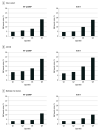Association of Cardiac Biomarkers With Major Adverse Cardiovascular Events in High-risk Patients With Diabetes: A Secondary Analysis of the DECLARE-TIMI 58 Trial
- PMID: 36857035
- PMCID: PMC9979005
- DOI: 10.1001/jamacardio.2023.0019
Association of Cardiac Biomarkers With Major Adverse Cardiovascular Events in High-risk Patients With Diabetes: A Secondary Analysis of the DECLARE-TIMI 58 Trial
Abstract
Importance: Dapagliflozin reduces the risk of hospitalizations for heart failure and the progression of chronic kidney disease in patients with and without type 2 diabetes (T2D), whereas the effects on reducing atherosclerotic events appear less clear.
Objective: To explore whether N-terminal pro-B-type natriuretic peptide (NT-proBNP) and high-sensitivity cardiac troponin T (hsTnT) levels can identify a subset of patients with T2D at higher risk and who might benefit more from dapagliflozin with regard to atherosclerotic events.
Design, setting, and participants: This was a secondary analysis of the DECLARE-TIMI 58 trial, a randomized clinical trial of dapagliflozin in patients with T2D and either multiple risk factors for atherosclerotic cardiovascular disease (ASCVD; approximately 60%) or established ASCVD (approximately 40%). All patients with available blood samples at randomization were included in these analyses. Data were collected from May 2013 to September 2018, and data were analyzed from May 2019 to June 2022.
Interventions: Dapagliflozin vs placebo.
Main outcomes and measures: Major adverse cardiovascular events (MACE), the composite of myocardial infarction, ischemic stroke, or cardiovascular death, which was one of dual primary outcomes of the main trial.
Results: Of 14 565 included patients, 9143 (62.8%) were male, and the mean (SD) age was 63.9 (6.8) years. When tested individually in a multivariable model for MACE risk, NT-proBNP and hsTnT were each significantly associated with the risk of MACE (adjusted hazard ratio [aHR] per 1 SD in log-transformed biomarker: NT-proBNP, 1.62; 95% CI, 1.49-1.76; hsTnT: 1.59; 95% CI, 1.46-1.74). The magnitude of the association was similar in patients with ASCVD (NT-proBNP: aHR, 1.60; 95% CI, 1.45-1.77; hsTnT: aHR, 1.62; 95% CI, 1.45-1.81) and multiple risk factors for ASCVD (NT-proBNP: aHR, 1.62; 95% CI, 1.40-1.88; hsTnT: aHR, 1.51; 95% CI, 1.29-1.77). Moreover, both biomarkers remained independently associated with MACE when both were included in the multivariable model (NT-proBNP: aHR, 1.46; 95% CI, 1.34-1.60; hsTnT: aHR, 1.39; 95% CI, 1.26-1.53). Modeled as a continuous variable, baseline biomarker levels did not modify the relative treatment effect of dapagliflozin vs placebo with MACE. However, the relative risk reduction numerically grew with higher biomarker levels, as did the baseline risk. Thus, MACE event rates were nominally lower in dapagliflozin-treated vs placebo-treated patients with biomarker concentrations in the top quartile (NT-proBNP: HR, 0.83; 95% CI, 0.71-0.97; absolute risk reduction [ARR], 2.4%; hsTnT: HR, 0.85; 95% CI, 0.72-0.99; ARR, 2.7%), whereas there was no significant treatment effect in patients with biomarkers levels in quartiles 1 to 3 (NT-proBNP: HR, 1.02; 95% CI, 0.88-1.18; ARR, 0%; hsTnT: HR, 0.97; 95% CI, 0.84-1.13; ARR, 0.2%).
Conclusions and relevance: In this study, NT-proBNP and hsTnT levels were associated with the risk for future cardiovascular events in both primary and secondary prevention patients with T2D. Both cardiac biomarkers were helpful to identify patients at very high risk for atherosclerotic events that may derive reduction in risk of MACE with dapagliflozin.
Trial registration: ClinicalTrials.gov Identifier: NCT01730534.
Conflict of interest statement
Figures



References
-
- Zelniker TA, Wiviott SD, Raz I, et al. SGLT2 inhibitors for primary and secondary prevention of cardiovascular and renal outcomes in type 2 diabetes: a systematic review and meta-analysis of cardiovascular outcome trials. Lancet. 2019;393(10166):31-39. doi: 10.1016/S0140-6736(18)32590-X - DOI - PubMed
Publication types
MeSH terms
Substances
Associated data
LinkOut - more resources
Full Text Sources
Medical
Research Materials

